Crime, Terrorism, and Security: Policy and Legal Reforms Analysis
VerifiedAdded on 2023/04/10
|11
|2370
|403
Report
AI Summary
This report examines potential policy and legislative reforms aimed at effectively countering terrorism without undermining civil and human rights. It begins by defining terrorism and its impact on human rights, then analyzes the challenges states face in balancing counter-terrorism measures with the protection of fundamental freedoms. The report discusses the need for a multi-faceted approach that includes intelligence gathering, social integration, and economic development. Recommendations include hardening security around sensitive areas, strengthening investigation capabilities, and understanding the root causes of terrorism to inform prevention policies. Ultimately, the report emphasizes that a comprehensive strategy involving military intelligence, social integration, political intelligence, and economic development is essential to effectively combat terrorism.
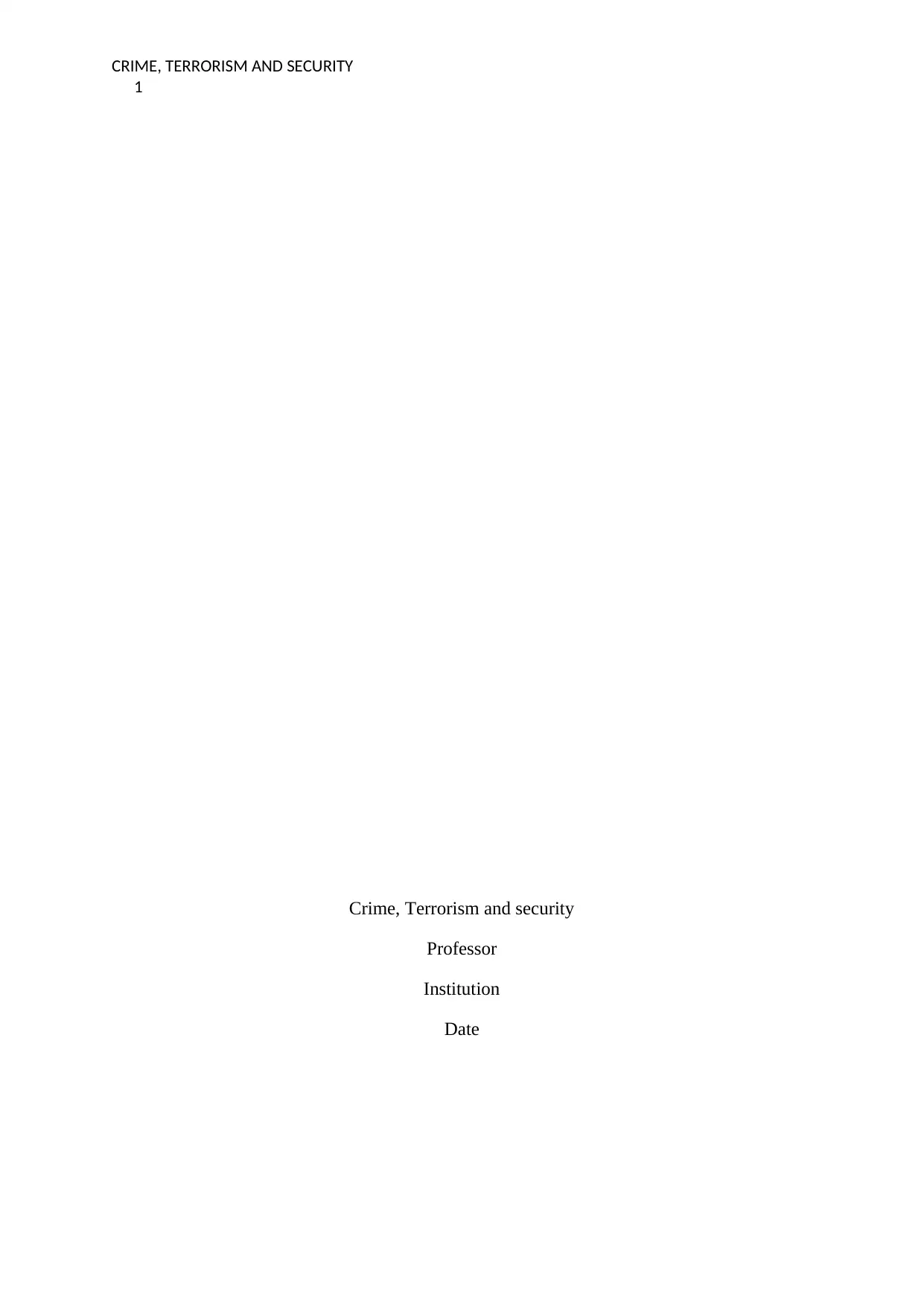
CRIME, TERRORISM AND SECURITY
1
Crime, Terrorism and security
Professor
Institution
Date
1
Crime, Terrorism and security
Professor
Institution
Date
Paraphrase This Document
Need a fresh take? Get an instant paraphrase of this document with our AI Paraphraser
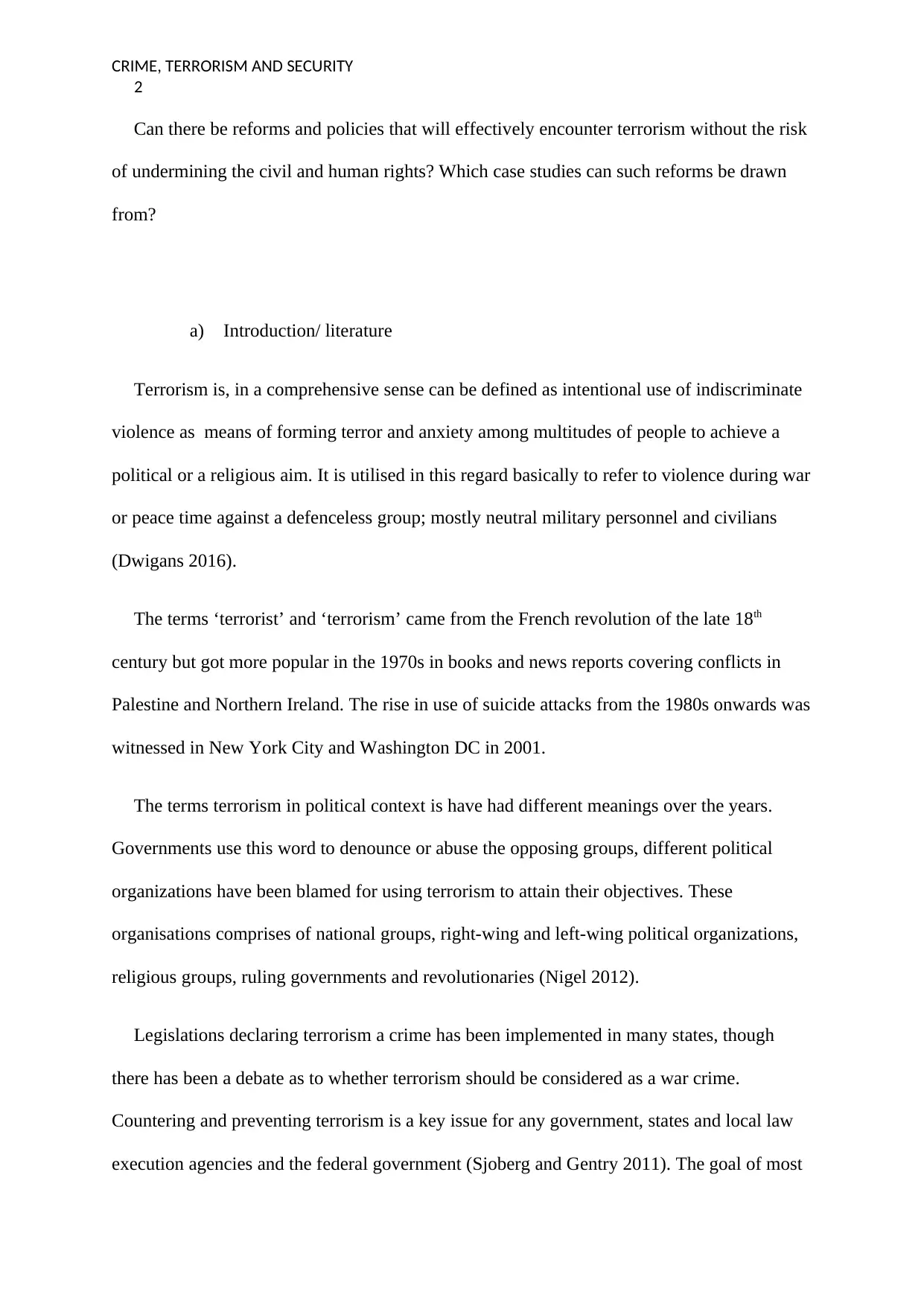
CRIME, TERRORISM AND SECURITY
2
Can there be reforms and policies that will effectively encounter terrorism without the risk
of undermining the civil and human rights? Which case studies can such reforms be drawn
from?
a) Introduction/ literature
Terrorism is, in a comprehensive sense can be defined as intentional use of indiscriminate
violence as means of forming terror and anxiety among multitudes of people to achieve a
political or a religious aim. It is utilised in this regard basically to refer to violence during war
or peace time against a defenceless group; mostly neutral military personnel and civilians
(Dwigans 2016).
The terms ‘terrorist’ and ‘terrorism’ came from the French revolution of the late 18th
century but got more popular in the 1970s in books and news reports covering conflicts in
Palestine and Northern Ireland. The rise in use of suicide attacks from the 1980s onwards was
witnessed in New York City and Washington DC in 2001.
The terms terrorism in political context is have had different meanings over the years.
Governments use this word to denounce or abuse the opposing groups, different political
organizations have been blamed for using terrorism to attain their objectives. These
organisations comprises of national groups, right-wing and left-wing political organizations,
religious groups, ruling governments and revolutionaries (Nigel 2012).
Legislations declaring terrorism a crime has been implemented in many states, though
there has been a debate as to whether terrorism should be considered as a war crime.
Countering and preventing terrorism is a key issue for any government, states and local law
execution agencies and the federal government (Sjoberg and Gentry 2011). The goal of most
2
Can there be reforms and policies that will effectively encounter terrorism without the risk
of undermining the civil and human rights? Which case studies can such reforms be drawn
from?
a) Introduction/ literature
Terrorism is, in a comprehensive sense can be defined as intentional use of indiscriminate
violence as means of forming terror and anxiety among multitudes of people to achieve a
political or a religious aim. It is utilised in this regard basically to refer to violence during war
or peace time against a defenceless group; mostly neutral military personnel and civilians
(Dwigans 2016).
The terms ‘terrorist’ and ‘terrorism’ came from the French revolution of the late 18th
century but got more popular in the 1970s in books and news reports covering conflicts in
Palestine and Northern Ireland. The rise in use of suicide attacks from the 1980s onwards was
witnessed in New York City and Washington DC in 2001.
The terms terrorism in political context is have had different meanings over the years.
Governments use this word to denounce or abuse the opposing groups, different political
organizations have been blamed for using terrorism to attain their objectives. These
organisations comprises of national groups, right-wing and left-wing political organizations,
religious groups, ruling governments and revolutionaries (Nigel 2012).
Legislations declaring terrorism a crime has been implemented in many states, though
there has been a debate as to whether terrorism should be considered as a war crime.
Countering and preventing terrorism is a key issue for any government, states and local law
execution agencies and the federal government (Sjoberg and Gentry 2011). The goal of most
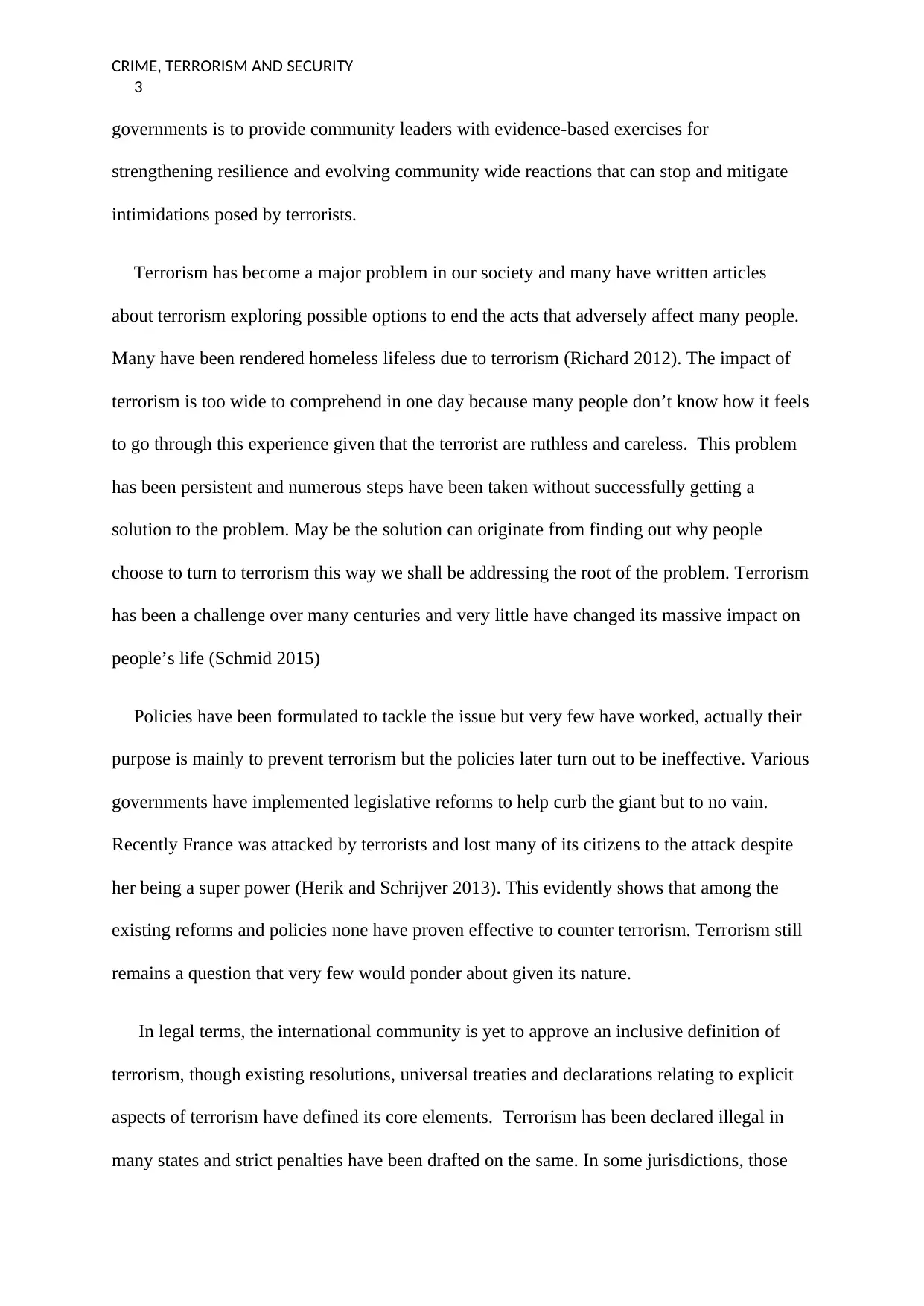
CRIME, TERRORISM AND SECURITY
3
governments is to provide community leaders with evidence-based exercises for
strengthening resilience and evolving community wide reactions that can stop and mitigate
intimidations posed by terrorists.
Terrorism has become a major problem in our society and many have written articles
about terrorism exploring possible options to end the acts that adversely affect many people.
Many have been rendered homeless lifeless due to terrorism (Richard 2012). The impact of
terrorism is too wide to comprehend in one day because many people don’t know how it feels
to go through this experience given that the terrorist are ruthless and careless. This problem
has been persistent and numerous steps have been taken without successfully getting a
solution to the problem. May be the solution can originate from finding out why people
choose to turn to terrorism this way we shall be addressing the root of the problem. Terrorism
has been a challenge over many centuries and very little have changed its massive impact on
people’s life (Schmid 2015)
Policies have been formulated to tackle the issue but very few have worked, actually their
purpose is mainly to prevent terrorism but the policies later turn out to be ineffective. Various
governments have implemented legislative reforms to help curb the giant but to no vain.
Recently France was attacked by terrorists and lost many of its citizens to the attack despite
her being a super power (Herik and Schrijver 2013). This evidently shows that among the
existing reforms and policies none have proven effective to counter terrorism. Terrorism still
remains a question that very few would ponder about given its nature.
In legal terms, the international community is yet to approve an inclusive definition of
terrorism, though existing resolutions, universal treaties and declarations relating to explicit
aspects of terrorism have defined its core elements. Terrorism has been declared illegal in
many states and strict penalties have been drafted on the same. In some jurisdictions, those
3
governments is to provide community leaders with evidence-based exercises for
strengthening resilience and evolving community wide reactions that can stop and mitigate
intimidations posed by terrorists.
Terrorism has become a major problem in our society and many have written articles
about terrorism exploring possible options to end the acts that adversely affect many people.
Many have been rendered homeless lifeless due to terrorism (Richard 2012). The impact of
terrorism is too wide to comprehend in one day because many people don’t know how it feels
to go through this experience given that the terrorist are ruthless and careless. This problem
has been persistent and numerous steps have been taken without successfully getting a
solution to the problem. May be the solution can originate from finding out why people
choose to turn to terrorism this way we shall be addressing the root of the problem. Terrorism
has been a challenge over many centuries and very little have changed its massive impact on
people’s life (Schmid 2015)
Policies have been formulated to tackle the issue but very few have worked, actually their
purpose is mainly to prevent terrorism but the policies later turn out to be ineffective. Various
governments have implemented legislative reforms to help curb the giant but to no vain.
Recently France was attacked by terrorists and lost many of its citizens to the attack despite
her being a super power (Herik and Schrijver 2013). This evidently shows that among the
existing reforms and policies none have proven effective to counter terrorism. Terrorism still
remains a question that very few would ponder about given its nature.
In legal terms, the international community is yet to approve an inclusive definition of
terrorism, though existing resolutions, universal treaties and declarations relating to explicit
aspects of terrorism have defined its core elements. Terrorism has been declared illegal in
many states and strict penalties have been drafted on the same. In some jurisdictions, those
⊘ This is a preview!⊘
Do you want full access?
Subscribe today to unlock all pages.

Trusted by 1+ million students worldwide
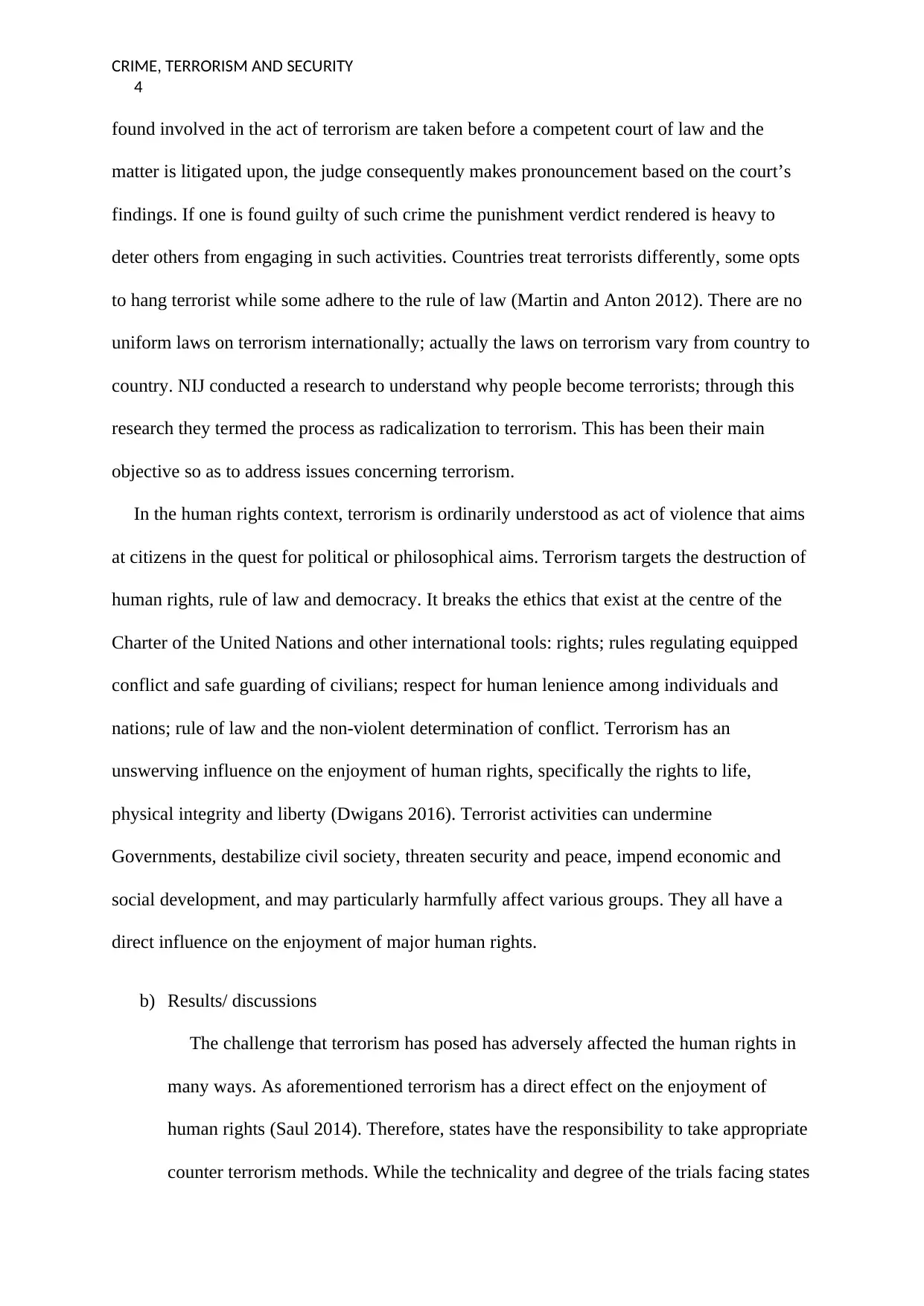
CRIME, TERRORISM AND SECURITY
4
found involved in the act of terrorism are taken before a competent court of law and the
matter is litigated upon, the judge consequently makes pronouncement based on the court’s
findings. If one is found guilty of such crime the punishment verdict rendered is heavy to
deter others from engaging in such activities. Countries treat terrorists differently, some opts
to hang terrorist while some adhere to the rule of law (Martin and Anton 2012). There are no
uniform laws on terrorism internationally; actually the laws on terrorism vary from country to
country. NIJ conducted a research to understand why people become terrorists; through this
research they termed the process as radicalization to terrorism. This has been their main
objective so as to address issues concerning terrorism.
In the human rights context, terrorism is ordinarily understood as act of violence that aims
at citizens in the quest for political or philosophical aims. Terrorism targets the destruction of
human rights, rule of law and democracy. It breaks the ethics that exist at the centre of the
Charter of the United Nations and other international tools: rights; rules regulating equipped
conflict and safe guarding of civilians; respect for human lenience among individuals and
nations; rule of law and the non-violent determination of conflict. Terrorism has an
unswerving influence on the enjoyment of human rights, specifically the rights to life,
physical integrity and liberty (Dwigans 2016). Terrorist activities can undermine
Governments, destabilize civil society, threaten security and peace, impend economic and
social development, and may particularly harmfully affect various groups. They all have a
direct influence on the enjoyment of major human rights.
b) Results/ discussions
The challenge that terrorism has posed has adversely affected the human rights in
many ways. As aforementioned terrorism has a direct effect on the enjoyment of
human rights (Saul 2014). Therefore, states have the responsibility to take appropriate
counter terrorism methods. While the technicality and degree of the trials facing states
4
found involved in the act of terrorism are taken before a competent court of law and the
matter is litigated upon, the judge consequently makes pronouncement based on the court’s
findings. If one is found guilty of such crime the punishment verdict rendered is heavy to
deter others from engaging in such activities. Countries treat terrorists differently, some opts
to hang terrorist while some adhere to the rule of law (Martin and Anton 2012). There are no
uniform laws on terrorism internationally; actually the laws on terrorism vary from country to
country. NIJ conducted a research to understand why people become terrorists; through this
research they termed the process as radicalization to terrorism. This has been their main
objective so as to address issues concerning terrorism.
In the human rights context, terrorism is ordinarily understood as act of violence that aims
at citizens in the quest for political or philosophical aims. Terrorism targets the destruction of
human rights, rule of law and democracy. It breaks the ethics that exist at the centre of the
Charter of the United Nations and other international tools: rights; rules regulating equipped
conflict and safe guarding of civilians; respect for human lenience among individuals and
nations; rule of law and the non-violent determination of conflict. Terrorism has an
unswerving influence on the enjoyment of human rights, specifically the rights to life,
physical integrity and liberty (Dwigans 2016). Terrorist activities can undermine
Governments, destabilize civil society, threaten security and peace, impend economic and
social development, and may particularly harmfully affect various groups. They all have a
direct influence on the enjoyment of major human rights.
b) Results/ discussions
The challenge that terrorism has posed has adversely affected the human rights in
many ways. As aforementioned terrorism has a direct effect on the enjoyment of
human rights (Saul 2014). Therefore, states have the responsibility to take appropriate
counter terrorism methods. While the technicality and degree of the trials facing states
Paraphrase This Document
Need a fresh take? Get an instant paraphrase of this document with our AI Paraphraser
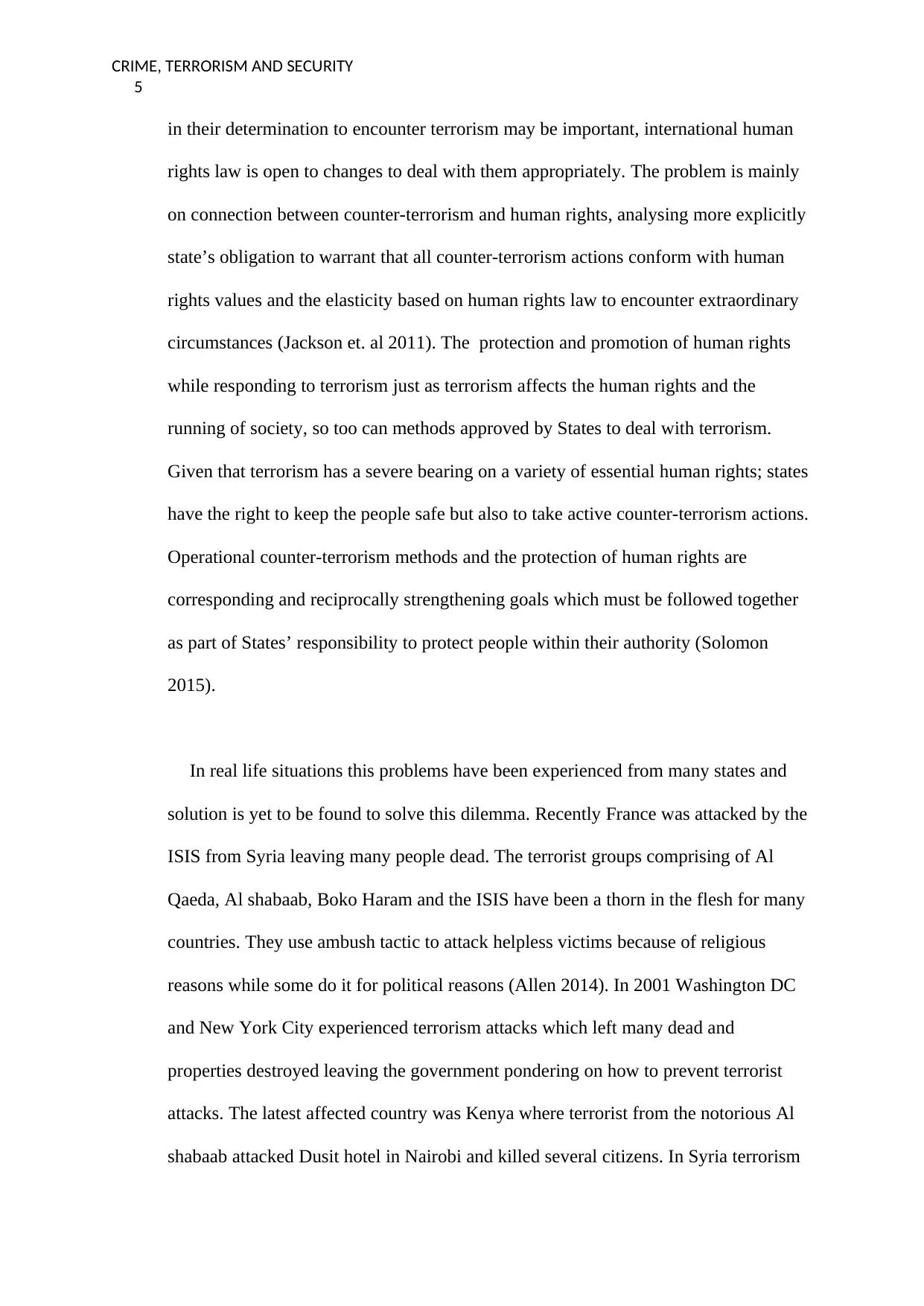
CRIME, TERRORISM AND SECURITY
5
in their determination to encounter terrorism may be important, international human
rights law is open to changes to deal with them appropriately. The problem is mainly
on connection between counter-terrorism and human rights, analysing more explicitly
state’s obligation to warrant that all counter-terrorism actions conform with human
rights values and the elasticity based on human rights law to encounter extraordinary
circumstances (Jackson et. al 2011). The protection and promotion of human rights
while responding to terrorism just as terrorism affects the human rights and the
running of society, so too can methods approved by States to deal with terrorism.
Given that terrorism has a severe bearing on a variety of essential human rights; states
have the right to keep the people safe but also to take active counter-terrorism actions.
Operational counter-terrorism methods and the protection of human rights are
corresponding and reciprocally strengthening goals which must be followed together
as part of States’ responsibility to protect people within their authority (Solomon
2015).
In real life situations this problems have been experienced from many states and
solution is yet to be found to solve this dilemma. Recently France was attacked by the
ISIS from Syria leaving many people dead. The terrorist groups comprising of Al
Qaeda, Al shabaab, Boko Haram and the ISIS have been a thorn in the flesh for many
countries. They use ambush tactic to attack helpless victims because of religious
reasons while some do it for political reasons (Allen 2014). In 2001 Washington DC
and New York City experienced terrorism attacks which left many dead and
properties destroyed leaving the government pondering on how to prevent terrorist
attacks. The latest affected country was Kenya where terrorist from the notorious Al
shabaab attacked Dusit hotel in Nairobi and killed several citizens. In Syria terrorism
5
in their determination to encounter terrorism may be important, international human
rights law is open to changes to deal with them appropriately. The problem is mainly
on connection between counter-terrorism and human rights, analysing more explicitly
state’s obligation to warrant that all counter-terrorism actions conform with human
rights values and the elasticity based on human rights law to encounter extraordinary
circumstances (Jackson et. al 2011). The protection and promotion of human rights
while responding to terrorism just as terrorism affects the human rights and the
running of society, so too can methods approved by States to deal with terrorism.
Given that terrorism has a severe bearing on a variety of essential human rights; states
have the right to keep the people safe but also to take active counter-terrorism actions.
Operational counter-terrorism methods and the protection of human rights are
corresponding and reciprocally strengthening goals which must be followed together
as part of States’ responsibility to protect people within their authority (Solomon
2015).
In real life situations this problems have been experienced from many states and
solution is yet to be found to solve this dilemma. Recently France was attacked by the
ISIS from Syria leaving many people dead. The terrorist groups comprising of Al
Qaeda, Al shabaab, Boko Haram and the ISIS have been a thorn in the flesh for many
countries. They use ambush tactic to attack helpless victims because of religious
reasons while some do it for political reasons (Allen 2014). In 2001 Washington DC
and New York City experienced terrorism attacks which left many dead and
properties destroyed leaving the government pondering on how to prevent terrorist
attacks. The latest affected country was Kenya where terrorist from the notorious Al
shabaab attacked Dusit hotel in Nairobi and killed several citizens. In Syria terrorism
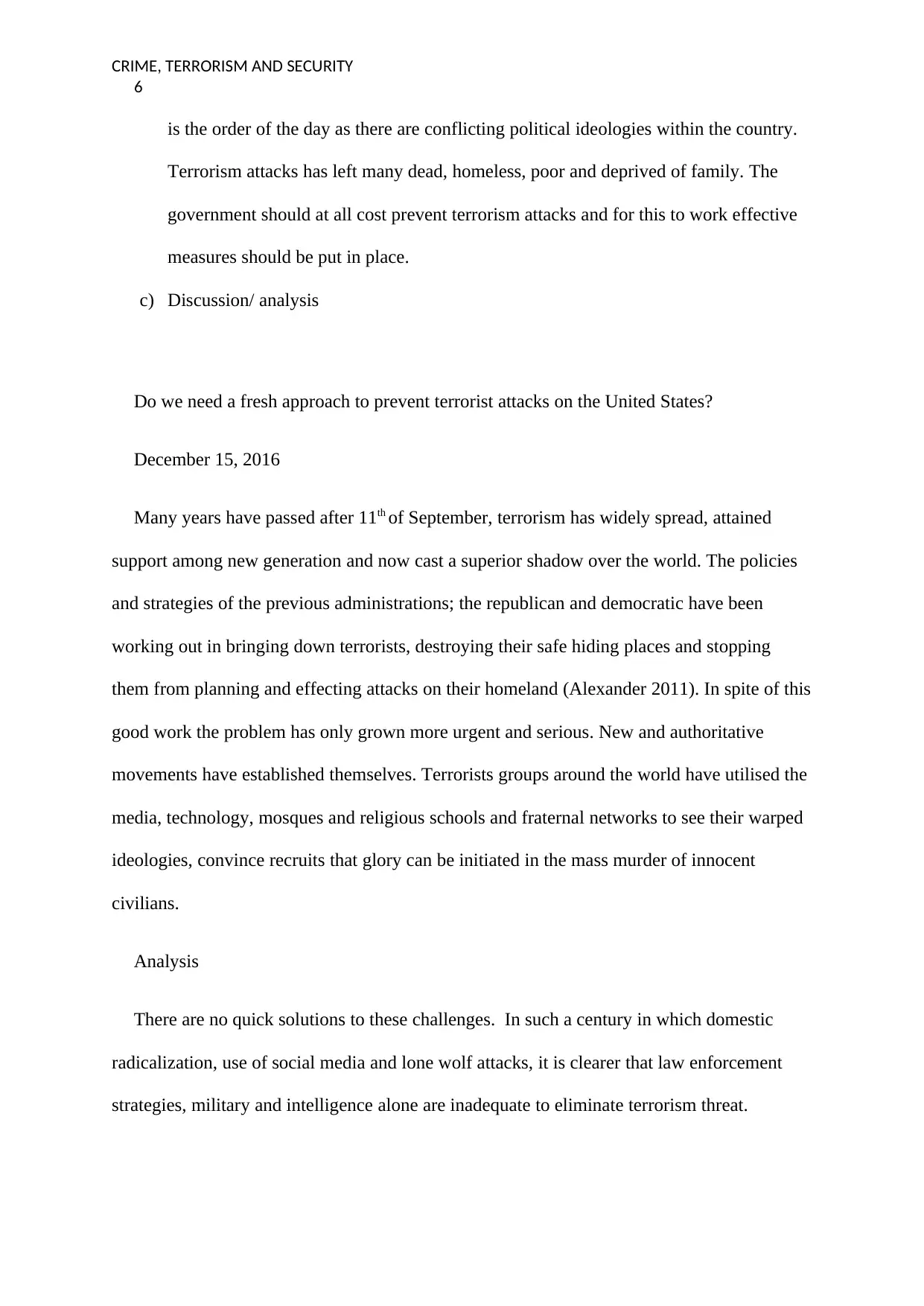
CRIME, TERRORISM AND SECURITY
6
is the order of the day as there are conflicting political ideologies within the country.
Terrorism attacks has left many dead, homeless, poor and deprived of family. The
government should at all cost prevent terrorism attacks and for this to work effective
measures should be put in place.
c) Discussion/ analysis
Do we need a fresh approach to prevent terrorist attacks on the United States?
December 15, 2016
Many years have passed after 11th of September, terrorism has widely spread, attained
support among new generation and now cast a superior shadow over the world. The policies
and strategies of the previous administrations; the republican and democratic have been
working out in bringing down terrorists, destroying their safe hiding places and stopping
them from planning and effecting attacks on their homeland (Alexander 2011). In spite of this
good work the problem has only grown more urgent and serious. New and authoritative
movements have established themselves. Terrorists groups around the world have utilised the
media, technology, mosques and religious schools and fraternal networks to see their warped
ideologies, convince recruits that glory can be initiated in the mass murder of innocent
civilians.
Analysis
There are no quick solutions to these challenges. In such a century in which domestic
radicalization, use of social media and lone wolf attacks, it is clearer that law enforcement
strategies, military and intelligence alone are inadequate to eliminate terrorism threat.
6
is the order of the day as there are conflicting political ideologies within the country.
Terrorism attacks has left many dead, homeless, poor and deprived of family. The
government should at all cost prevent terrorism attacks and for this to work effective
measures should be put in place.
c) Discussion/ analysis
Do we need a fresh approach to prevent terrorist attacks on the United States?
December 15, 2016
Many years have passed after 11th of September, terrorism has widely spread, attained
support among new generation and now cast a superior shadow over the world. The policies
and strategies of the previous administrations; the republican and democratic have been
working out in bringing down terrorists, destroying their safe hiding places and stopping
them from planning and effecting attacks on their homeland (Alexander 2011). In spite of this
good work the problem has only grown more urgent and serious. New and authoritative
movements have established themselves. Terrorists groups around the world have utilised the
media, technology, mosques and religious schools and fraternal networks to see their warped
ideologies, convince recruits that glory can be initiated in the mass murder of innocent
civilians.
Analysis
There are no quick solutions to these challenges. In such a century in which domestic
radicalization, use of social media and lone wolf attacks, it is clearer that law enforcement
strategies, military and intelligence alone are inadequate to eliminate terrorism threat.
⊘ This is a preview!⊘
Do you want full access?
Subscribe today to unlock all pages.

Trusted by 1+ million students worldwide
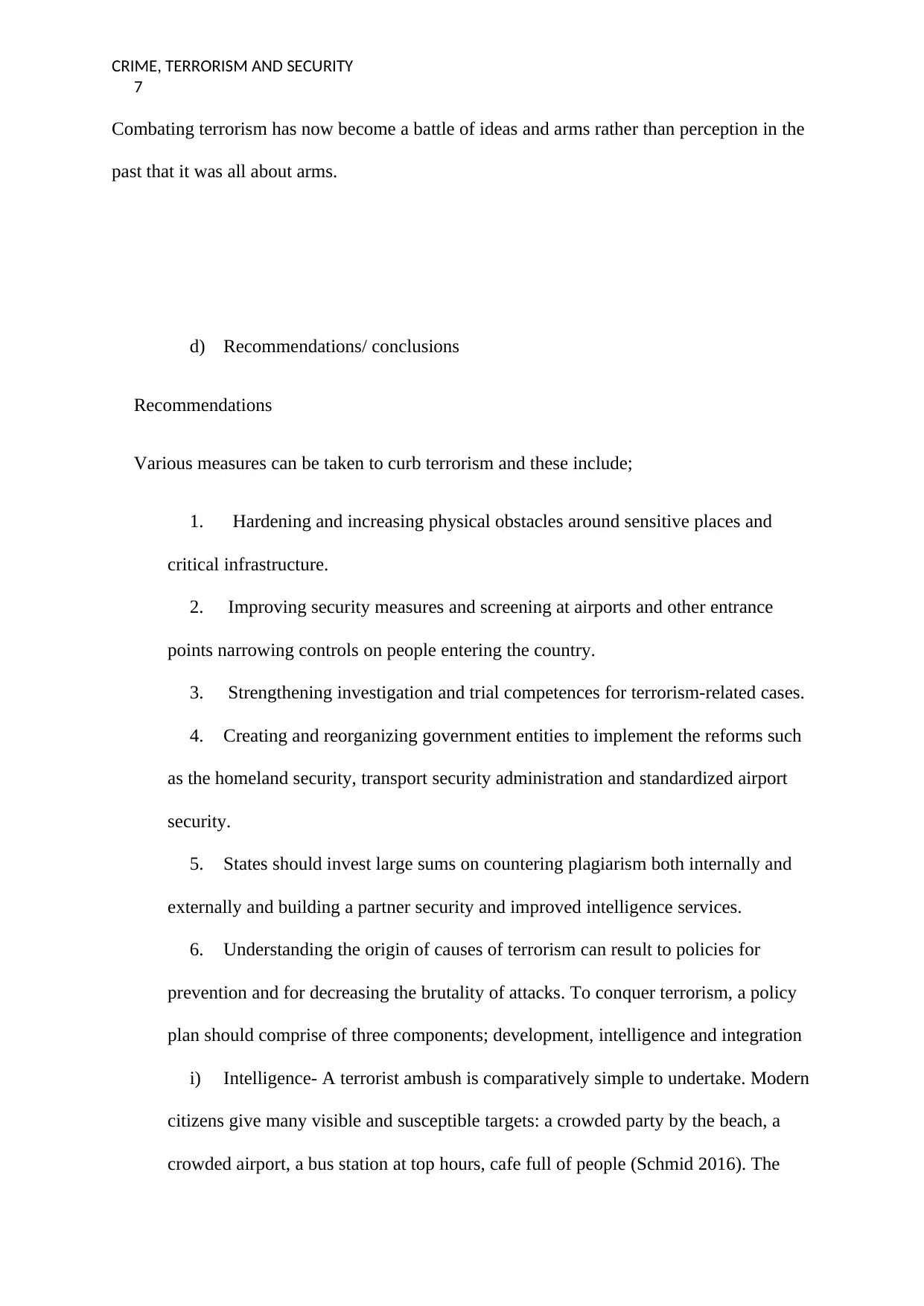
CRIME, TERRORISM AND SECURITY
7
Combating terrorism has now become a battle of ideas and arms rather than perception in the
past that it was all about arms.
d) Recommendations/ conclusions
Recommendations
Various measures can be taken to curb terrorism and these include;
1. Hardening and increasing physical obstacles around sensitive places and
critical infrastructure.
2. Improving security measures and screening at airports and other entrance
points narrowing controls on people entering the country.
3. Strengthening investigation and trial competences for terrorism-related cases.
4. Creating and reorganizing government entities to implement the reforms such
as the homeland security, transport security administration and standardized airport
security.
5. States should invest large sums on countering plagiarism both internally and
externally and building a partner security and improved intelligence services.
6. Understanding the origin of causes of terrorism can result to policies for
prevention and for decreasing the brutality of attacks. To conquer terrorism, a policy
plan should comprise of three components; development, intelligence and integration
i) Intelligence- A terrorist ambush is comparatively simple to undertake. Modern
citizens give many visible and susceptible targets: a crowded party by the beach, a
crowded airport, a bus station at top hours, cafe full of people (Schmid 2016). The
7
Combating terrorism has now become a battle of ideas and arms rather than perception in the
past that it was all about arms.
d) Recommendations/ conclusions
Recommendations
Various measures can be taken to curb terrorism and these include;
1. Hardening and increasing physical obstacles around sensitive places and
critical infrastructure.
2. Improving security measures and screening at airports and other entrance
points narrowing controls on people entering the country.
3. Strengthening investigation and trial competences for terrorism-related cases.
4. Creating and reorganizing government entities to implement the reforms such
as the homeland security, transport security administration and standardized airport
security.
5. States should invest large sums on countering plagiarism both internally and
externally and building a partner security and improved intelligence services.
6. Understanding the origin of causes of terrorism can result to policies for
prevention and for decreasing the brutality of attacks. To conquer terrorism, a policy
plan should comprise of three components; development, intelligence and integration
i) Intelligence- A terrorist ambush is comparatively simple to undertake. Modern
citizens give many visible and susceptible targets: a crowded party by the beach, a
crowded airport, a bus station at top hours, cafe full of people (Schmid 2016). The
Paraphrase This Document
Need a fresh take? Get an instant paraphrase of this document with our AI Paraphraser
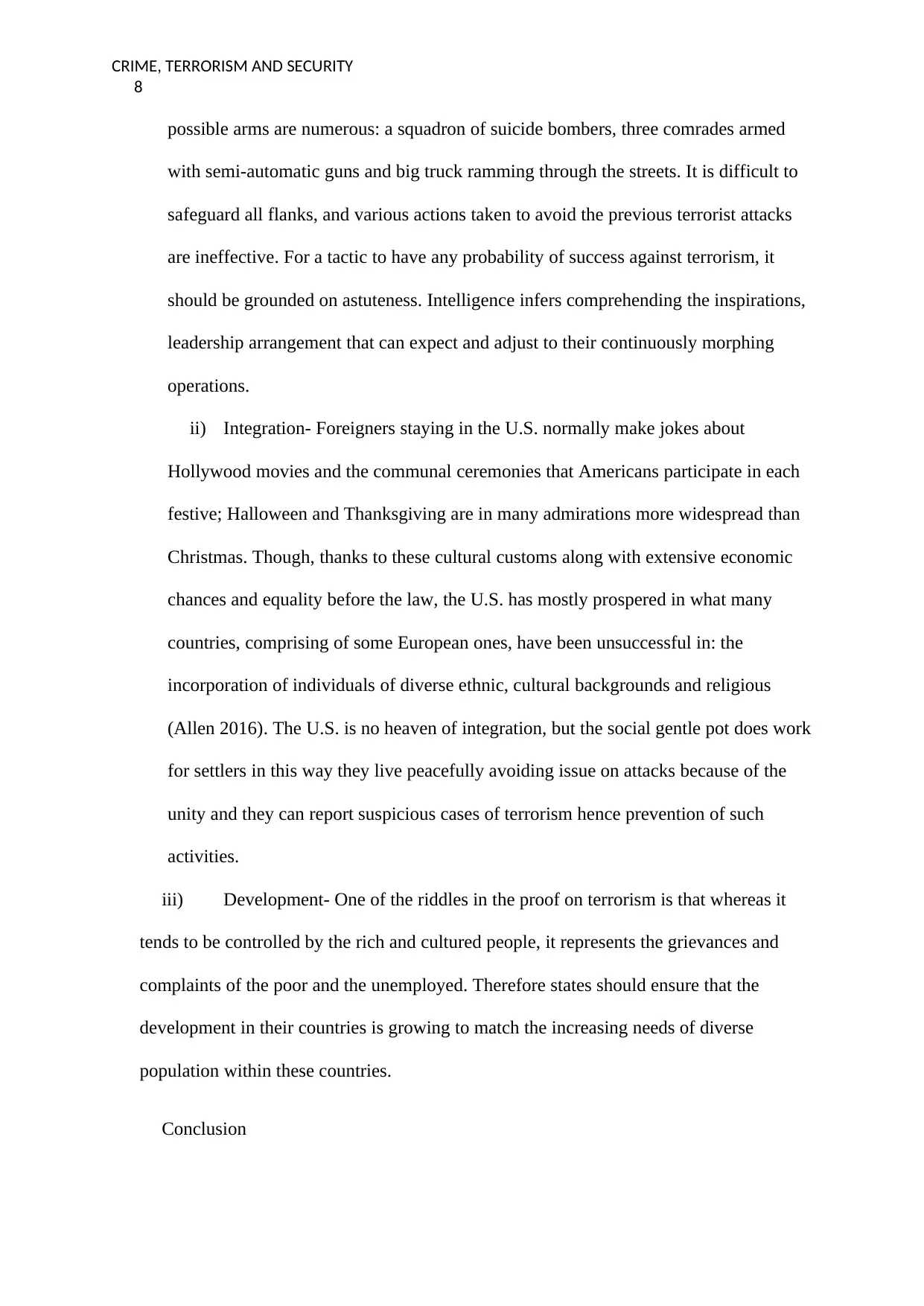
CRIME, TERRORISM AND SECURITY
8
possible arms are numerous: a squadron of suicide bombers, three comrades armed
with semi-automatic guns and big truck ramming through the streets. It is difficult to
safeguard all flanks, and various actions taken to avoid the previous terrorist attacks
are ineffective. For a tactic to have any probability of success against terrorism, it
should be grounded on astuteness. Intelligence infers comprehending the inspirations,
leadership arrangement that can expect and adjust to their continuously morphing
operations.
ii) Integration- Foreigners staying in the U.S. normally make jokes about
Hollywood movies and the communal ceremonies that Americans participate in each
festive; Halloween and Thanksgiving are in many admirations more widespread than
Christmas. Though, thanks to these cultural customs along with extensive economic
chances and equality before the law, the U.S. has mostly prospered in what many
countries, comprising of some European ones, have been unsuccessful in: the
incorporation of individuals of diverse ethnic, cultural backgrounds and religious
(Allen 2016). The U.S. is no heaven of integration, but the social gentle pot does work
for settlers in this way they live peacefully avoiding issue on attacks because of the
unity and they can report suspicious cases of terrorism hence prevention of such
activities.
iii) Development- One of the riddles in the proof on terrorism is that whereas it
tends to be controlled by the rich and cultured people, it represents the grievances and
complaints of the poor and the unemployed. Therefore states should ensure that the
development in their countries is growing to match the increasing needs of diverse
population within these countries.
Conclusion
8
possible arms are numerous: a squadron of suicide bombers, three comrades armed
with semi-automatic guns and big truck ramming through the streets. It is difficult to
safeguard all flanks, and various actions taken to avoid the previous terrorist attacks
are ineffective. For a tactic to have any probability of success against terrorism, it
should be grounded on astuteness. Intelligence infers comprehending the inspirations,
leadership arrangement that can expect and adjust to their continuously morphing
operations.
ii) Integration- Foreigners staying in the U.S. normally make jokes about
Hollywood movies and the communal ceremonies that Americans participate in each
festive; Halloween and Thanksgiving are in many admirations more widespread than
Christmas. Though, thanks to these cultural customs along with extensive economic
chances and equality before the law, the U.S. has mostly prospered in what many
countries, comprising of some European ones, have been unsuccessful in: the
incorporation of individuals of diverse ethnic, cultural backgrounds and religious
(Allen 2016). The U.S. is no heaven of integration, but the social gentle pot does work
for settlers in this way they live peacefully avoiding issue on attacks because of the
unity and they can report suspicious cases of terrorism hence prevention of such
activities.
iii) Development- One of the riddles in the proof on terrorism is that whereas it
tends to be controlled by the rich and cultured people, it represents the grievances and
complaints of the poor and the unemployed. Therefore states should ensure that the
development in their countries is growing to match the increasing needs of diverse
population within these countries.
Conclusion
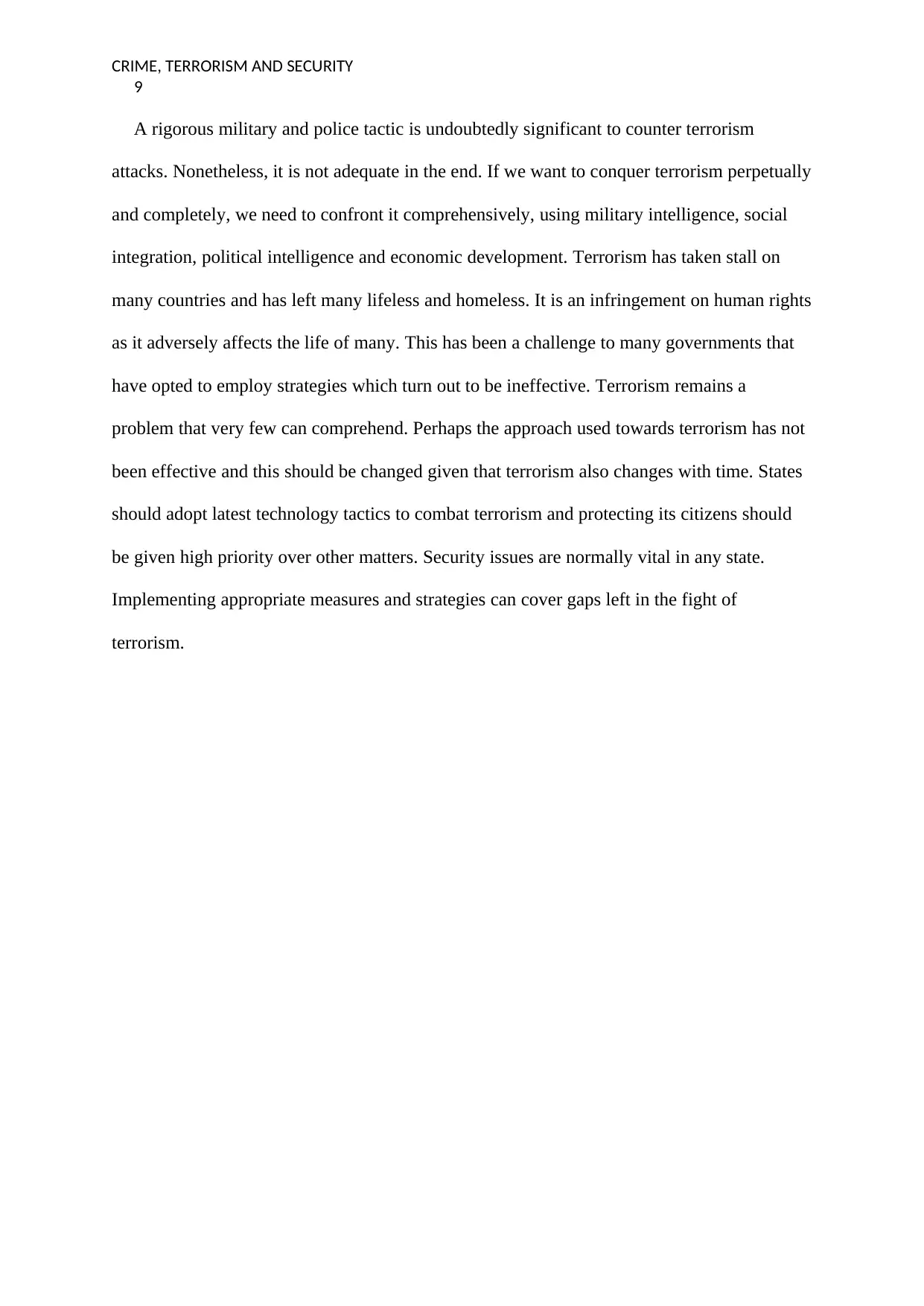
CRIME, TERRORISM AND SECURITY
9
A rigorous military and police tactic is undoubtedly significant to counter terrorism
attacks. Nonetheless, it is not adequate in the end. If we want to conquer terrorism perpetually
and completely, we need to confront it comprehensively, using military intelligence, social
integration, political intelligence and economic development. Terrorism has taken stall on
many countries and has left many lifeless and homeless. It is an infringement on human rights
as it adversely affects the life of many. This has been a challenge to many governments that
have opted to employ strategies which turn out to be ineffective. Terrorism remains a
problem that very few can comprehend. Perhaps the approach used towards terrorism has not
been effective and this should be changed given that terrorism also changes with time. States
should adopt latest technology tactics to combat terrorism and protecting its citizens should
be given high priority over other matters. Security issues are normally vital in any state.
Implementing appropriate measures and strategies can cover gaps left in the fight of
terrorism.
9
A rigorous military and police tactic is undoubtedly significant to counter terrorism
attacks. Nonetheless, it is not adequate in the end. If we want to conquer terrorism perpetually
and completely, we need to confront it comprehensively, using military intelligence, social
integration, political intelligence and economic development. Terrorism has taken stall on
many countries and has left many lifeless and homeless. It is an infringement on human rights
as it adversely affects the life of many. This has been a challenge to many governments that
have opted to employ strategies which turn out to be ineffective. Terrorism remains a
problem that very few can comprehend. Perhaps the approach used towards terrorism has not
been effective and this should be changed given that terrorism also changes with time. States
should adopt latest technology tactics to combat terrorism and protecting its citizens should
be given high priority over other matters. Security issues are normally vital in any state.
Implementing appropriate measures and strategies can cover gaps left in the fight of
terrorism.
⊘ This is a preview!⊘
Do you want full access?
Subscribe today to unlock all pages.

Trusted by 1+ million students worldwide
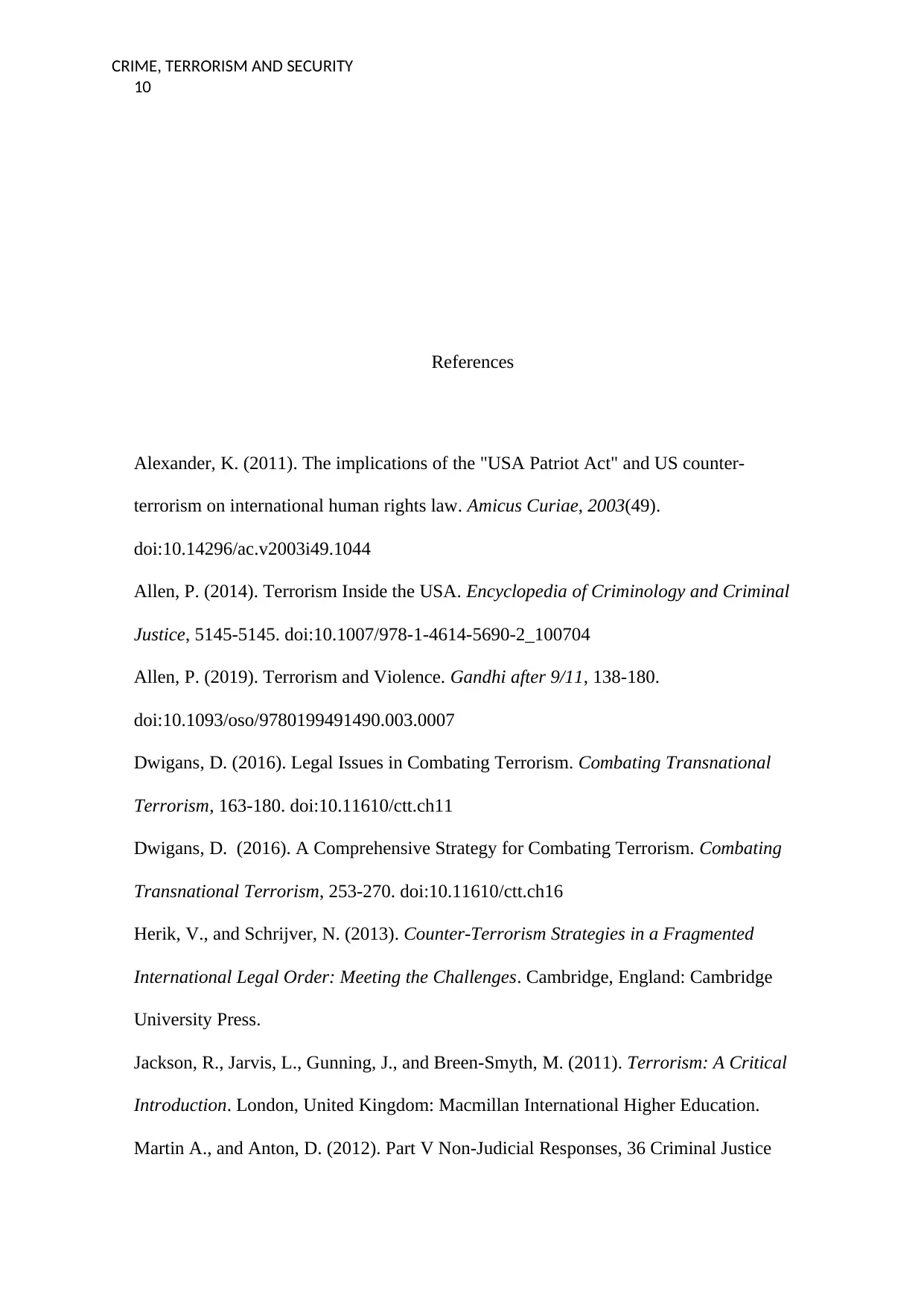
CRIME, TERRORISM AND SECURITY
10
References
Alexander, K. (2011). The implications of the "USA Patriot Act" and US counter-
terrorism on international human rights law. Amicus Curiae, 2003(49).
doi:10.14296/ac.v2003i49.1044
Allen, P. (2014). Terrorism Inside the USA. Encyclopedia of Criminology and Criminal
Justice, 5145-5145. doi:10.1007/978-1-4614-5690-2_100704
Allen, P. (2019). Terrorism and Violence. Gandhi after 9/11, 138-180.
doi:10.1093/oso/9780199491490.003.0007
Dwigans, D. (2016). Legal Issues in Combating Terrorism. Combating Transnational
Terrorism, 163-180. doi:10.11610/ctt.ch11
Dwigans, D. (2016). A Comprehensive Strategy for Combating Terrorism. Combating
Transnational Terrorism, 253-270. doi:10.11610/ctt.ch16
Herik, V., and Schrijver, N. (2013). Counter-Terrorism Strategies in a Fragmented
International Legal Order: Meeting the Challenges. Cambridge, England: Cambridge
University Press.
Jackson, R., Jarvis, L., Gunning, J., and Breen-Smyth, M. (2011). Terrorism: A Critical
Introduction. London, United Kingdom: Macmillan International Higher Education.
Martin A., and Anton, D. (2012). Part V Non-Judicial Responses, 36 Criminal Justice
10
References
Alexander, K. (2011). The implications of the "USA Patriot Act" and US counter-
terrorism on international human rights law. Amicus Curiae, 2003(49).
doi:10.14296/ac.v2003i49.1044
Allen, P. (2014). Terrorism Inside the USA. Encyclopedia of Criminology and Criminal
Justice, 5145-5145. doi:10.1007/978-1-4614-5690-2_100704
Allen, P. (2019). Terrorism and Violence. Gandhi after 9/11, 138-180.
doi:10.1093/oso/9780199491490.003.0007
Dwigans, D. (2016). Legal Issues in Combating Terrorism. Combating Transnational
Terrorism, 163-180. doi:10.11610/ctt.ch11
Dwigans, D. (2016). A Comprehensive Strategy for Combating Terrorism. Combating
Transnational Terrorism, 253-270. doi:10.11610/ctt.ch16
Herik, V., and Schrijver, N. (2013). Counter-Terrorism Strategies in a Fragmented
International Legal Order: Meeting the Challenges. Cambridge, England: Cambridge
University Press.
Jackson, R., Jarvis, L., Gunning, J., and Breen-Smyth, M. (2011). Terrorism: A Critical
Introduction. London, United Kingdom: Macmillan International Higher Education.
Martin A., and Anton, D. (2012). Part V Non-Judicial Responses, 36 Criminal Justice
Paraphrase This Document
Need a fresh take? Get an instant paraphrase of this document with our AI Paraphraser
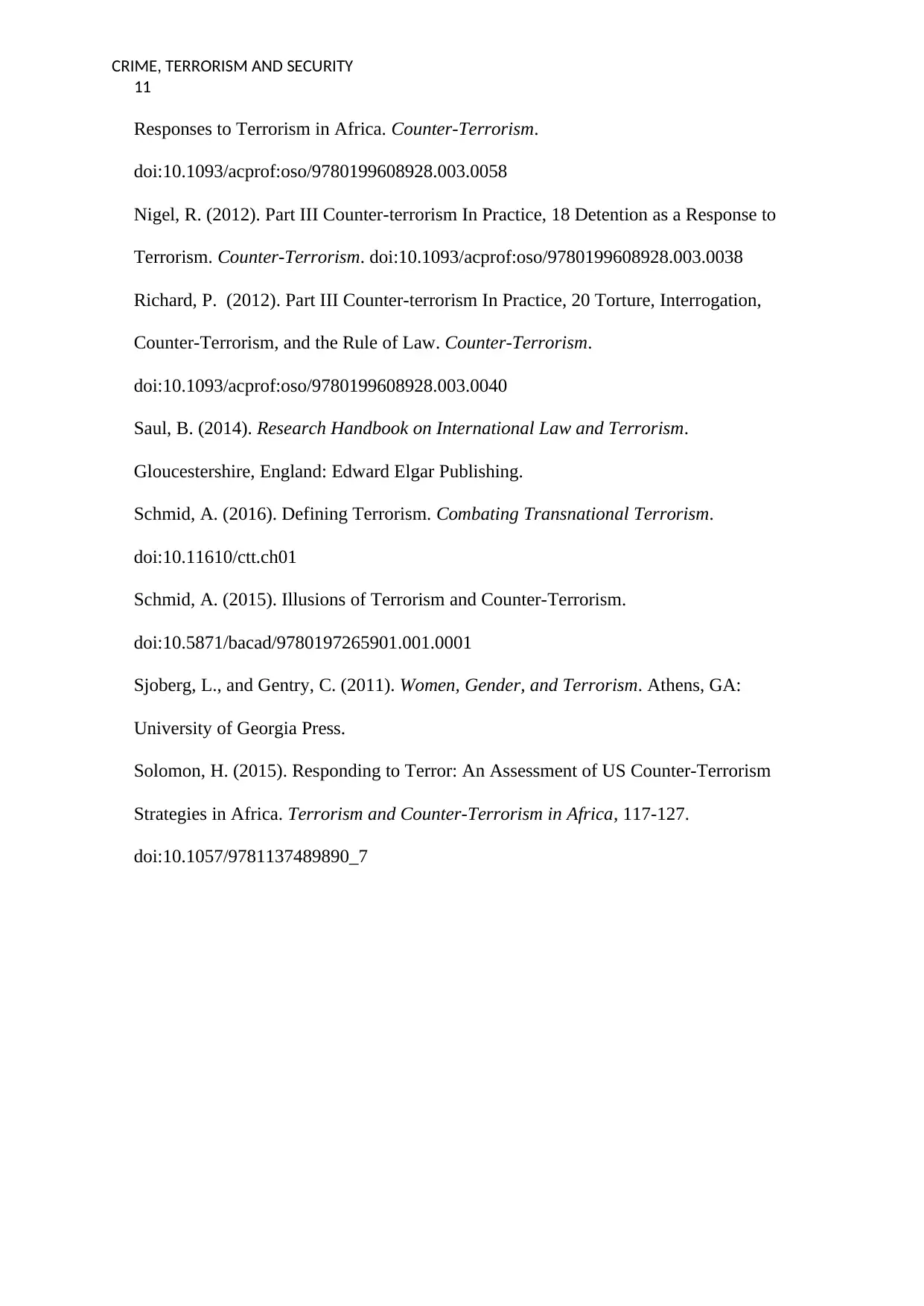
CRIME, TERRORISM AND SECURITY
11
Responses to Terrorism in Africa. Counter-Terrorism.
doi:10.1093/acprof:oso/9780199608928.003.0058
Nigel, R. (2012). Part III Counter-terrorism In Practice, 18 Detention as a Response to
Terrorism. Counter-Terrorism. doi:10.1093/acprof:oso/9780199608928.003.0038
Richard, P. (2012). Part III Counter-terrorism In Practice, 20 Torture, Interrogation,
Counter-Terrorism, and the Rule of Law. Counter-Terrorism.
doi:10.1093/acprof:oso/9780199608928.003.0040
Saul, B. (2014). Research Handbook on International Law and Terrorism.
Gloucestershire, England: Edward Elgar Publishing.
Schmid, A. (2016). Defining Terrorism. Combating Transnational Terrorism.
doi:10.11610/ctt.ch01
Schmid, A. (2015). Illusions of Terrorism and Counter-Terrorism.
doi:10.5871/bacad/9780197265901.001.0001
Sjoberg, L., and Gentry, C. (2011). Women, Gender, and Terrorism. Athens, GA:
University of Georgia Press.
Solomon, H. (2015). Responding to Terror: An Assessment of US Counter-Terrorism
Strategies in Africa. Terrorism and Counter-Terrorism in Africa, 117-127.
doi:10.1057/9781137489890_7
11
Responses to Terrorism in Africa. Counter-Terrorism.
doi:10.1093/acprof:oso/9780199608928.003.0058
Nigel, R. (2012). Part III Counter-terrorism In Practice, 18 Detention as a Response to
Terrorism. Counter-Terrorism. doi:10.1093/acprof:oso/9780199608928.003.0038
Richard, P. (2012). Part III Counter-terrorism In Practice, 20 Torture, Interrogation,
Counter-Terrorism, and the Rule of Law. Counter-Terrorism.
doi:10.1093/acprof:oso/9780199608928.003.0040
Saul, B. (2014). Research Handbook on International Law and Terrorism.
Gloucestershire, England: Edward Elgar Publishing.
Schmid, A. (2016). Defining Terrorism. Combating Transnational Terrorism.
doi:10.11610/ctt.ch01
Schmid, A. (2015). Illusions of Terrorism and Counter-Terrorism.
doi:10.5871/bacad/9780197265901.001.0001
Sjoberg, L., and Gentry, C. (2011). Women, Gender, and Terrorism. Athens, GA:
University of Georgia Press.
Solomon, H. (2015). Responding to Terror: An Assessment of US Counter-Terrorism
Strategies in Africa. Terrorism and Counter-Terrorism in Africa, 117-127.
doi:10.1057/9781137489890_7
1 out of 11
Related Documents
Your All-in-One AI-Powered Toolkit for Academic Success.
+13062052269
info@desklib.com
Available 24*7 on WhatsApp / Email
![[object Object]](/_next/static/media/star-bottom.7253800d.svg)
Unlock your academic potential
Copyright © 2020–2026 A2Z Services. All Rights Reserved. Developed and managed by ZUCOL.





